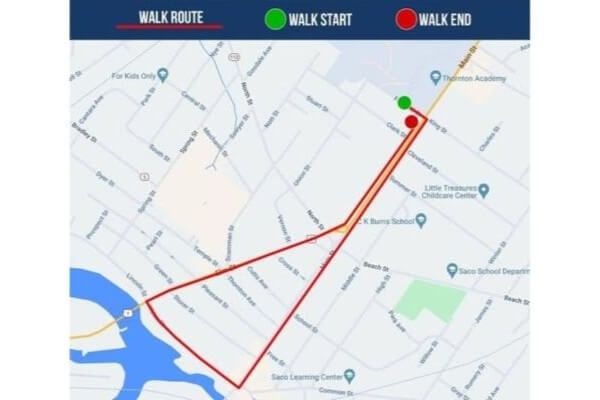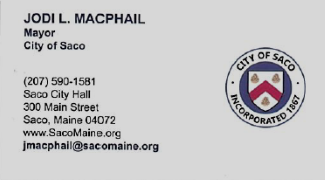Biddeford-Saco group advocates for renters, encourages policy change
 |
|
Matt Gile, Kayla Lewis, Abigail Woods and Cat Bates of Twin City Tenants Alliance at a listening session held April 5 at McArthur Library in Biddeford. The group advocates for renters’ rights and is proposing reforms to the twin cities’ rental policies. PHOTO BY ANN FISHER
|
Thu, Apr 10, 2025 |
With no end in sight to the lack of affordable housing in the area, Twin City Tenants' Alliance is ramping up its advocacy for renters' rights.
About 25 people filled the chairs at McArthur Library in Biddeford on Saturday, April 5, to learn about the TCTA’s policy proposals, hear local housing stories, and learn about their rights as tenants.
The group started meeting a year ago. According to a follow-up email from TCTA, the crux of the matter was made clear at a Feb. 11 Biddeford Housing Workshop, where the panel was made up of nine developers and those who fund them. Renters – “an often vulnerable population directly and acutely affected by this crisis” – were not asked to participate.
“The TCTA believes tenants need a seat at the tables where decisions are made,” the email asserted.
“In this room we have power,” said Matt Gile of TCTA at the meeting.
It’s not just a question of rights, it’s a matter of money: the Area Median Income, used as the barometer in Biddeford, is the middle income on the scale. If 101 incomes are compared, the 51st person’s income would be the AMI. In Biddeford, that’s $69,794, based on 2023 data.
“Why do you think we track income by AMI and not average?,” TCTA asked rhetorically in its literature.
The people speak
A woman who moved to Saco from Austin, Texas, a year ago said one landlord wanted the first and last months’ rent in addition to a deposit for a $1,600 one bedroom apartment – not including utilities.
She found that one property management company “covers a lot of area” and developers told them what they could afford, not the other way around.
Apartments are “shocking,” the woman said. “Rent is insane.”
Another person spoke about an apartment he rented that wasn’t sufficiently heated, with a leak in the ceiling, a squirrel in the wall and a broken gutter that was in danger of falling and injuring someone.
There were “a lot of scary factors.” said the man, who was afraid he could be evicted if he complained. “I was young and didn’t know my rights,” he added.
The TCTA emailed individual invites to the event to the City Councils and staff of both Biddeford and Saco, as well as state and county officials.
They did not attend, “but we feel it's very important for them to hear directly from renters; we presented this as an opportunity to do just that, and they declined,” said an Alliance representative in a later email.
Progress in Portland
Buddy Moore of the Portland Rent Board spoke about what worked in the Forest City. Lobbying the council didn’t gain any traction, so the group put forth a series of referendums, and, in 2022, things improved with a ban on application fees, tenant protections and rent stabilization. Tenants’ rights are now posted in all buildings.
Moore also advised the Biddeford-Saco group about what actions it can take, such as lobbying to prevent landlords from charging application fees as a way to profit on vacant buildings.
“The two things are really tied together,” Moore said, and getting a lease agreement with the rent charged is important as well.
Door-to-door visits and setting up tables to engage the public are effective, along with sending postcards with a personal message.
Transparency is key, but “getting that data can be a fight,” Moore said. “City staff can drag their feet.”
He cautioned that “passing one thing doesn’t mean it’s done. There’s always a challenge”
“Make the status quo feel challenged in a public way,” Moore said.
The group stressed they are not anti- landlord; several have joined the alliance, one member said at the meeting.
A planner’s perspective
More units is only one solution, said a Southern Maine planner and climate action advocate who asked to remain anonymous.
He called the biggest hurdle to available housing is the low number of dwelling units allowed on parcels of land.
A lot of zoning standards are based on prejudice, the planner said, which “ended up hurting the middle class” because they were written to keep out certain groups of people as a way to “preserve a neighborhood’s ‘character.’”
When housing is expensive, public safety is endangered if first responders can’t afford to live in the communities they serve and are not readily available during weather events and emergencies.
Concerning climate action, subdivisions have the worst housing density, with fewer trees and sparse development.
“Renting is one of the most efficient forms of housing,” he said, urging residents to go to meetings and speak up. “Make people know that you are listening.”
Action plan
The group is working on two policy proposals. The first is banning “junk fees” that are either excessive or greater than the landlord’s cost for a service. Those include application fees and fees for cleaning, trash disposal and pets. Attempts to have tenants pay for services already provided under state law, for example, trash pick-up, should be banned as well, the group contends.
Junk fees can also include fees that prevent competition, such as requiring a particular internet or cable provider. Banning fees introduced mid-lease or with fewer than 90 days’ notice are also being pursued.
To increase transparency, TCTA wants to see the cities include more information in rental registries. Biddeford requires buildings with more than two units to register, but only requires the landlord’s name and phone number. They say rent charged, what utilities are included, vacancies by month and unit sizes should be required. The information should be made available on the cities’ websites.
Next steps
The group is planning more community engagement, trainings, education and awareness for policy initiatives, gathering community input and support for their proposals, and eventually, after garnering enough community support, bringing these policies forward.
See linktr.ee/twincitytenantsalliance for resources. Questions may be directed to twincityta@gmail.com.
Ann Fisher is a freelance journalist based in Saco. She can be reached at 432-7483.















